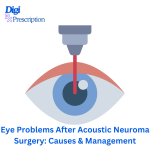
Acoustic neuroma, also known as vestibular schwannoma, is a benign tumor that affects the hearing and balance nerves in the inner ear. While surgery is an effective treatment, it can sometimes lead to eye-related complications due to nerve damage, particularly affecting the facial and eye muscles.
In this blog post, we’ll discuss the common eye problems after acoustic neuroma surgery, their causes, symptoms, and treatment options.
Why Does Acoustic Neuroma Surgery Affect the Eyes?
The facial nerve (cranial nerve VII) and trigeminal nerve (cranial nerve V) are located near the tumor. Surgery to remove the tumor can damage these nerves, leading to issues with blinking, tear production, and eye movement.
Common Eye Problems After Surgery
✔ Dry Eyes (Keratitis) – Difficulty blinking properly leads to dryness and irritation.
✔ Facial Weakness (Bell’s Palsy) – Affects eyelid movement, causing incomplete eye closure.
✔ Double Vision (Diplopia) – Muscle weakness or nerve damage affects eye alignment.
✔ Blurred Vision – Corneal exposure and dryness can reduce clarity.
✔ Eye Pain or Irritation – Due to nerve damage affecting tear production and sensation.
Common Eye Problems and Their Causes
| Eye Problem | Cause | Symptoms | Treatment |
|---|---|---|---|
| Dry Eyes (Keratitis) | Incomplete blinking | Redness, irritation, discomfort | Artificial tears, lubricating ointments |
| Facial Weakness (Bell’s Palsy) | Facial nerve damage | Difficulty closing the eye, drooping face | Eye patches, physical therapy |
| Double Vision (Diplopia) | Nerve damage affecting muscles | Seeing two images of one object | Eye exercises, special glasses |
| Blurred Vision | Corneal exposure, dryness | Hazy or unclear vision | Lubricating eye drops, moisture chamber glasses |
| Eye Pain | Nerve damage or dryness | Burning, discomfort | Medicated eye drops, moisture therapy |
Managing Eye Problems After Acoustic Neuroma Surgery
1. Treating Dry Eyes & Corneal Protection
✔ Artificial Tears – Use preservative-free lubricating drops to keep eyes moist.
✔ Ointments at Night – Prevents dryness during sleep.
✔ Eyelid Taping – Helps keep the eye closed during sleep if blinking is incomplete.
✔ Moisture Chamber Glasses – Special glasses that retain moisture and protect the eyes.
2. Managing Facial Weakness & Bell’s Palsy
✔ Facial Exercises & Therapy – Strengthens weak muscles.
✔ Botox Injections – Helps control abnormal muscle movements.
✔ Gold or Platinum Eyelid Weight Surgery – A small weight is inserted in the eyelid to help it close properly.
3. Correcting Double Vision & Blurred Vision
✔ Prism Glasses – Help align images for clearer vision.
✔ Eye Patching – Temporary relief for severe cases.
✔ Surgery (if needed) – In rare cases, eye muscle surgery may be required.
4. Reducing Eye Irritation & Pain
✔ Avoid Harsh Wind & Air Conditioning – Prevents excess dryness.
✔ Use a Humidifier – Keeps indoor air moist to protect the eyes.
✔ Regular Eye Checkups – Helps detect complications early.
When to See an Eye Doctor
Seek medical help if you experience:
✔ Severe eye pain or persistent redness
✔ Vision loss or worsening blurry vision
✔ Inability to close your eye completely
✔ Frequent infections or excessive dryness
Conclusion
Eye problems after acoustic neuroma surgery are common but manageable with proper care. Treatments like artificial tears, facial therapy, protective eyewear, and medical intervention can significantly improve symptoms. If you or a loved one is recovering from acoustic neuroma surgery, working with an eye specialist can help prevent long-term complications.
References:
-
American Academy of Ophthalmology (AAO) – Eye complications after neurosurgery – https://www.aao.org
-
National Institute on Deafness and Other Communication Disorders (NIDCD) – Acoustic Neuroma Symptoms & Treatment – https://www.nidcd.nih.gov
-
Mayo Clinic – Acoustic Neuroma & Post-Surgery Recovery – https://www.mayoclinic.org
